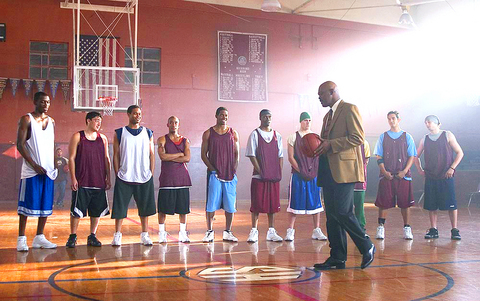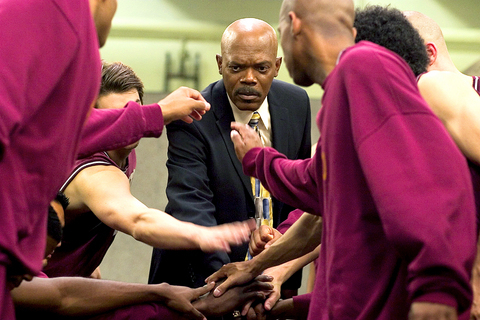As its title suggests, Coach Carter belongs, with recent pictures like Friday Night Lights and Remember the Titans, to that special subcategory of sports movies, the inspirational coach drama. More often than not, movies of this kind are based on -- or, in the more common title-sequence idiom, "inspired by" -- the real lives of men who turn ragged bunches of misfits into champions, or at least contenders, teaching valuable lessons about discipline and teamwork along the way.
Their stories, which march toward the big climactic game, pausing for uplifting speeches and off-the-field crises, are popular with audiences and also with actors. When they can no longer plausibly play professional athletes, male movie stars turn to on-screen coaching, which is rewarding and -- in spite of all the yelling and speechifying -- generally undemanding work. Gene Hackman did it in Hoosiers, as did Denzel Washington in Titans, Billy Bob Thornton in Friday Night Lights, and, to stretch the category a little, Walter Matthau in The Bad News Bears.
And now Samuel L. Jackson joins their clipboard-thumping, my-way-or-the-highway company, playing Ken Carter, real-life coach of a high school basketball team in the tough Northern California city of Richmond. In this solid, unsurprising film, Carter, who was an all-American at Richmond High in the 1970s, has become a successful local businessman, with a sporting-goods store, a midnight-blue sedan and a tidy Craftsman bungalow. He also has a wife (Debbi Morgan), who in coach-movie tradition has a few early lines of dialogue, after which she is relegated to the sidelines, where she bites her lip and pumps her fists at appropriate moments. The coach's son, Damien (Robert Ri'Chard), has a bit more screen time; he's a promising point guard who transfers from a prosperous parochial school -- which is also a perennial basketball powerhouse -- to play for his dad in the run-down Richmond gym.

Coach Carter, directed by Thomas Carter (no relation to the coach) from a screenplay by Mark Schwahn and John Gatins, is both a rousing, by-the-book sports story -- it's amazing how many games are decided by a dramatic shot at the final buzzer -- and a critique of the place of sports in American culture.
The dramatic climax comes not when Richmond wins a big game but when Carter, discovering that his players are faltering in the classroom, locks them out of the gym, an action that makes him a media celebrity and a local pariah. It also turns Coach Carter from a standard inspirational coach drama into an inspirational educator drama, putting Jackson in the company of actors like Morgan Freeman (Lean on Me) and Michelle Pfeiffer (Dangerous Minds).
These movies are not known for originality. Part of their appeal is the sturdy reassurance that their conventions offer, and the plot of Coach Carter provides very few surprises. Carter, a veteran of television whose most recent film was Save the Last Dance, respects the sentimental rules of the genre, but his genuine interest in his young characters -- in basketball, in hip-hop, in the anxious rhythms of teenage male friendship and sexuality -- gives the movie more realism, and more bounce, than it might otherwise have.

PHOTOS COURTESY OF UNIVERSAL
To call Coach Carter's methods old school would be both a cliche and an understatement. Inheriting a multiracial squad of underachievers united in a spirit of hip-hop insolence, he wastes no time in laying down some strict new rules. To play for him, these young men -- or "young sirs," as he calls them, with a hint of sarcasm -- must show up on time to practice, wear neckties on game day and sign a contract promising to maintain a 2.3 grade-point average. The punishment for talking back is several hundred push-ups or "suicides," those grueling cross-court sprints that bring special joy to the hearts of sadistic gym teachers across the land.
Not that Carter enjoys inflicting pain on his players, though the grim smirk that sometimes plays across Jackson's stern features suggests that his character does not exactly share their misery. But it is, of course, for their own good. The educational system, represented by the harried, cynical principal (Denise Dowse) has all but given up on these boys, and the tough love of their coach may offer their only chance of escape from the poverty and despair that surrounds them. The off-court challenges they face are sketched in a series of subplots. Kenyon, a sweet-faced forward played by Rob Brown (Finding Forrester) has impregnated his girlfriend, Kyra (the R 'n' B singer Ashanti, making her film debut), which puts his athletic and academic ambitions in conflict with his impulse to do the right thing. Timo (Rick Gonzalez) is an angry, insecure young man sliding toward a life of gang-banging and drug dealing. Junior (Nana Gbewonyo), the team's center, can barely read a newspaper article chronicling his brilliant exploits on the court.
Jackson acts with his usual steely authority -- his Coach Carter is so convinced of his righteousness that he never needs to be nice -- leaving it to the younger cast members to supply warmth and levity as they absorb his stern lessons. Gonzalez and Brown are especially strong, and Antwon Tanner, playing the team's designated joker, Worm, cuts the solemnity with impish wit. This may be the coach's story, but to the extent that Coach Carter is interesting rather than merely inspirational, it's because of the team.

On April 26, The Lancet published a letter from two doctors at Taichung-based China Medical University Hospital (CMUH) warning that “Taiwan’s Health Care System is on the Brink of Collapse.” The authors said that “Years of policy inaction and mismanagement of resources have led to the National Health Insurance system operating under unsustainable conditions.” The pushback was immediate. Errors in the paper were quickly identified and publicized, to discredit the authors (the hospital apologized). CNA reported that CMUH said the letter described Taiwan in 2021 as having 62 nurses per 10,000 people, when the correct number was 78 nurses per 10,000

As we live longer, our risk of cognitive impairment is increasing. How can we delay the onset of symptoms? Do we have to give up every indulgence or can small changes make a difference? We asked neurologists for tips on how to keep our brains healthy for life. TAKE CARE OF YOUR HEALTH “All of the sensible things that apply to bodily health apply to brain health,” says Suzanne O’Sullivan, a consultant in neurology at the National Hospital for Neurology and Neurosurgery in London, and the author of The Age of Diagnosis. “When you’re 20, you can get away with absolute

May 5 to May 11 What started out as friction between Taiwanese students at Taichung First High School and a Japanese head cook escalated dramatically over the first two weeks of May 1927. It began on April 30 when the cook’s wife knew that lotus starch used in that night’s dinner had rat feces in it, but failed to inform staff until the meal was already prepared. The students believed that her silence was intentional, and filed a complaint. The school’s Japanese administrators sided with the cook’s family, dismissing the students as troublemakers and clamping down on their freedoms — with

As Donald Trump’s executive order in March led to the shuttering of Voice of America (VOA) — the global broadcaster whose roots date back to the fight against Nazi propaganda — he quickly attracted support from figures not used to aligning themselves with any US administration. Trump had ordered the US Agency for Global Media, the federal agency that funds VOA and other groups promoting independent journalism overseas, to be “eliminated to the maximum extent consistent with applicable law.” The decision suddenly halted programming in 49 languages to more than 425 million people. In Moscow, Margarita Simonyan, the hardline editor-in-chief of the